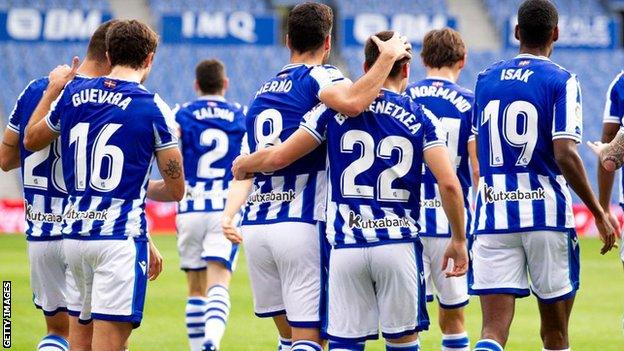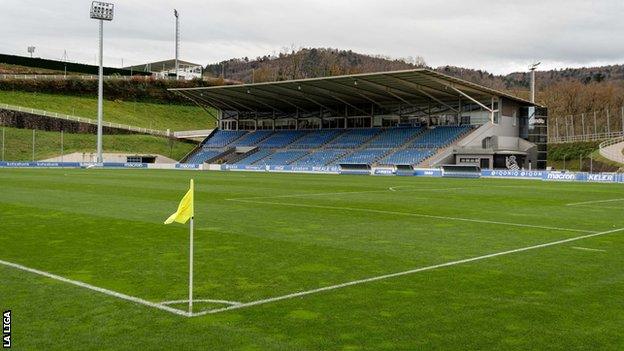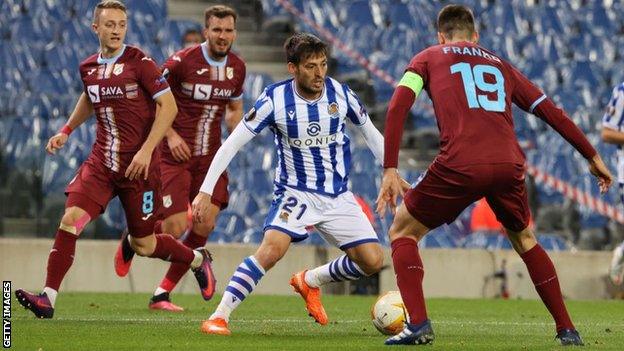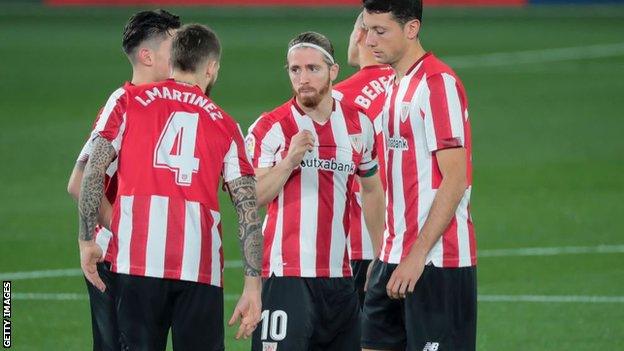Athletic Bilbao v Real Sociedad: How La Real's trust in youth is paying off
- Published

Real Sociedad finished sixth last season to qualify for the Europa League
Perched on Spain's northern coast are rival clubs whose unique philosophies set them apart from the rest of La Liga.
For Real Sociedad, faith in their academy is bearing fruit as they travel to Athletic Bilbao for the Basque derby on Thursday looking to reignite an unlikely title challenge.
The San Sebastian side's form has stuttered of late, dropping out of top spot during a winless run in December that has included defeats by Atletico Madrid and Barcelona.
But La Real remain in the Champions League places and have caught the eye with their possession-based, attacking style of football.
"We have a style of play that favours the squad we have and suits everyone," explains winger Mikel Oyarzabal.
"What's more important is that whoever plays in the team, while still important, it is less important when the idea is clear and we know what we have to do."
That philosophy permeates through the club, who will face Manchester United in the Europa League last 32 in February, and is helped by the first-team squad boasting 16 academy products.
Letting talented youngsters 'be kids'
Few top European clubs have put as much emphasis on integrating young players into their side as La Real, whose unique approach includes only signing academy players at under-13 level.
Academy director Luki Iriarte says the club wants youngsters to "have the chance to be kids first", allowing them to work on different sports before committing to football.
The club does not believe in entering academy tournaments too early and feels their approach allows players to arrive "as open-minded, more flexible individuals".
Real Sociedad's state-of-the-art Zubieta training base, located in the Gipuzkoa countryside 15 minutes outside San Sebastian, is home to both their first team and young players.
Manager Imanol Alguacil is a product of Zubieta, playing more than 100 times in the club's first team, while reserve team boss Xabi Alonso also began his career there.

Sociedad's Zubieta base opened in 1980 and they won successive titles in the following two years
It worked for the likes of World Cup winners Alonso and Antoine Griezmann, who joined Sociedad after failing to find a French club and went on to score 52 times in 201 games before leaving for Atletico Madrid in 2014.
Spain's Alonso also moved on, joining Liverpool before trophy-laden spells with Real Madrid and Bayern Munich.
Spain full-back Alvaro Odriozola is another to join Real Madrid, as did Asier Illarramendi, before returning to San Sebastian. So how do the club stop their best prospects being poached?
"We want every generation to be better than the last," says Iriarte.
"This job isn't something that happens at the last moment. The player gets to choose.
"We are very aware we have to take care of our players right from day one, with them being able to see we are committed to the youth system and that our philosophy is based on that.
"We know we are not always going to be able to keep every player who comes through. Xabi Alonso for example left, Illarramendi left and came back, Xabi Prieto was able to stay - he spent his entire career here at Real Sociedad and we hope for the same outcome for Oyarzabal. He's got the opportunity to continue growing here.
"It is a job we have to do on an everyday basis, to make the players feel they can complete their objectives here at Real Sociedad."
How Sociedad broke from tradition

David Silva has played in 11 of La Real's 16 La Liga games this season
Spain international Oyarzabal is regarded as Zubieta's most exciting product since now-Barcelona forward Griezmann, while 19-year-old winger Ander Barrenetxea - the club's youngest debutant in more than 80 years - also looks set to have a big future.
Born in Eibar, halfway between San Sebastian and Bilbao, 23-year-old Oyarzabal arrived at La Real's academy from his hometown club in 2011 at the age of 14 and was handed his first-team debut by David Moyes four years later.
Sporting director Roberto Olabe, another former Sociedad player, has complemented the club's successful academy programme with smart recruitment, highlighted by the signing of David Silva from Manchester City on a free transfer this season.
Breaking from the tradition of only using Basque players in 1989 has allowed La Real to fine tune their squad with talents from outside the region.
Rivals Athletic Bilbao still stick to this principle, making their longevity particularly impressive.
They have never been relegated from the top flight and will at some point meet Real Sociedad in last season's delayed Copa del Rey final.

Athletic captain Iker Muniain, born in Pamplona, has spent his whole career at the club
A focus on producing home-grown talents is arguably more important for Athletic than their Basque rivals, because of the limited talent pool from which they can recruit.
They went 884 days between August 2015 and January 2018 without making a transfer, bringing that spell to an end with the signing of defender Inigo Martinez from Real Sociedad.
Like La Real, they boast a top-class academy at Lezama and have 16 graduates in their squad, but have failed to hold on to some of their most talented players in recent seasons, with defender Aymeric Laporte joining Manchester City and goalkeeper Kepa Arrizabalaga signing for Chelsea.
"It is never easy to bring in talent," explains former Athletic striker Aritz Aduriz, who began his career at Lezama and played more than 300 games during three spells for Athletic, before retiring earlier this year.
"Athletic have over 120 years of history of doing this, bringing through players in their own way and getting players from the youth system or around the region."
Aduriz says, with five clubs from the Basque Country now in La Liga, there is stiff competition for talented youngsters, but suggests the idea of representing Bilbao gives them an edge.
"The teams around us are getting stronger all the time. It is not easy to pick players up from other clubs," adds the 39-year-old. "But it is bearing fruit.
"I am very proud of the way things are done here. I always use the phrase a 'group of friends' or 'family' to describe us. These words are well integrated with the philosophy of the club."

Festive food: Think you've eaten enough to master this quiz?
Dunkirk (2017) is streaming now: Christopher Nolan's wartime epic on the legendary evacuation
